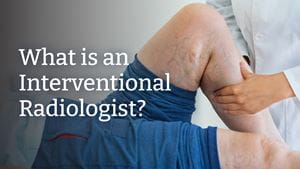
Before you undergo any vascular treatments, you should fully research the procedure and any language you might hear from your vein specialist. Several key terms associated with varicose vein treatment may confuse patients. The definitions in this article should help you understand the important words for a more informed discussion with your doctor and/or vein specialist.
An interventional radiologist, or IR, is a physician who specializes in utilizing imaging guidance to diagnose and then treat using minimally invasive procedures. They treat diseases in nearly every organ system in the body, especially in arteries and veins.
Interventional radiologists use several types of imaging including ultrasound, x-ray fluoroscopy, CT scans, and MRI. One of the unifying themes of all interventional radiologists is performing procedures using minimally invasive techniques.
You probably hear the term minimally invasive treatment, procedure, or surgery said a lot, but you might not know what it actually means.
A minimally invasive approach involves the least possible damage to the body, typically requiring only a small incision or nick not much bigger than a needle. Advantages of using minimally invasive techniques abound -- less risk of bleeding, lower chance of infection, less painful procedures requiring minimal if any sedation, smaller incisions leading to smaller scars, often no sutures required, and less overall risk of the procedures.
Thermal vein ablation is an example of a minimally invasive treatment. Generally speaking, minimally invasive procedures such as ablations are strongly preferred by nearly all patients and have made more invasive surgeries obsolete.
Chronic venous insufficiency is the condition associated with varicose veins. Veins carry blood to your heart from the rest of the body. Blood valves in the legs prevent the blood from refluxing, or going back, down towards the feet instead of to the heart.
With venous insufficiency, the blood cannot properly flow to the heart, so it pools in the veins and can cause bulging, painful varicose veins.
Patients have several options for varicose vein treatment. For most patients, varicose vein surgery is unnecessary and has been rendered nearly obsolete; instead, they can undergo minimally invasive procedures. Some of the most common treatment options include: